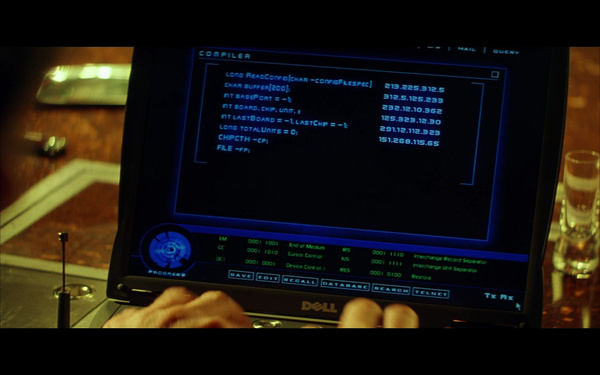
A blog that displays and details source code shown on screen in TV Shows and movies is gaining considerable attention.
Have you ever watched a TV show or a movie that used either science- or techno-jargon too liberally as part of its plot? This could probably apply to a lot of Sci-Fi shows and movies, where the characters have gotten themselves into a spot of bother, only to have their sharp intellect and admirable knowledge of physics or whatever it may be, come to the rescue.
Quite often we are treated to a Chopra-like avalanche of sciency-sounding words which lead to a conclusion. The sciency stuff is not supposed to matter, it is not supposed to be scrutinized, all you should care about as the viewer is what it enables the characters to do. That can be difficult if you have even the slightest bit of knowledge in a field potentially being butchered on screen, so you have to work that little bit harder to suspend your disbelief.
When it comes to physics and other science stuff though, sometimes we can chalk it up to the story being set in the future when we know more about the nature of reality and can exploit the natural world that little bit more efficiently.
Spare a thought though for programmers and developers who are often treated to on-screen depictions of source code, which they can understand, and often find it has absolutely nothing to do with what it is supposed to be. They are being asked to believe that the code is some sophisticated instruction set written by a brainiac to achieve a powerful transcendent effect - but they can tell by looking at it that it simply prints "Hello World!"
A blog - Source Code in TV and Films - has set out to document as many of these scenes as possible and to identify the origin of the source code, or to attempt to explain what the source code is intended for, or to do.
For example, did you catch a glimpse of the code used to reboot the Elysium station in the film of the same name? It turns out the code is lifted straight from an Intel manual. It is assembly language for an Intel x86 processor.
Another example is the 2001 movie Swordfish, starring Hugh Jackman and John Travolta. In it, Jackman's character Stanley Jobson, is actually using a genuine code used to crack DES encryption in the 1980s, so somebody at least gave a thought trying to be realistic with the code in that scene.
Unfortunately, Tony Stark - aka Iron Man - can't be awarded the same consideration for the code he uses given that the source code shown during the first boot up sequence in the cave in the first movie, turns out to be valid C code (though missing some important syntax) from a firmware downloader for the RCX - a programmable, microcontroller-based Lego brick - written in 1998. You can find the source code with Google.
There are plenty of other examples at the blog, which is definitely worth checking out.
Quite often we are treated to a Chopra-like avalanche of sciency-sounding words which lead to a conclusion. The sciency stuff is not supposed to matter, it is not supposed to be scrutinized, all you should care about as the viewer is what it enables the characters to do. That can be difficult if you have even the slightest bit of knowledge in a field potentially being butchered on screen, so you have to work that little bit harder to suspend your disbelief.
When it comes to physics and other science stuff though, sometimes we can chalk it up to the story being set in the future when we know more about the nature of reality and can exploit the natural world that little bit more efficiently.
Spare a thought though for programmers and developers who are often treated to on-screen depictions of source code, which they can understand, and often find it has absolutely nothing to do with what it is supposed to be. They are being asked to believe that the code is some sophisticated instruction set written by a brainiac to achieve a powerful transcendent effect - but they can tell by looking at it that it simply prints "Hello World!"
A blog - Source Code in TV and Films - has set out to document as many of these scenes as possible and to identify the origin of the source code, or to attempt to explain what the source code is intended for, or to do.
For example, did you catch a glimpse of the code used to reboot the Elysium station in the film of the same name? It turns out the code is lifted straight from an Intel manual. It is assembly language for an Intel x86 processor.
Another example is the 2001 movie Swordfish, starring Hugh Jackman and John Travolta. In it, Jackman's character Stanley Jobson, is actually using a genuine code used to crack DES encryption in the 1980s, so somebody at least gave a thought trying to be realistic with the code in that scene.
Unfortunately, Tony Stark - aka Iron Man - can't be awarded the same consideration for the code he uses given that the source code shown during the first boot up sequence in the cave in the first movie, turns out to be valid C code (though missing some important syntax) from a firmware downloader for the RCX - a programmable, microcontroller-based Lego brick - written in 1998. You can find the source code with Google.
There are plenty of other examples at the blog, which is definitely worth checking out.
Tags:
Source Code













